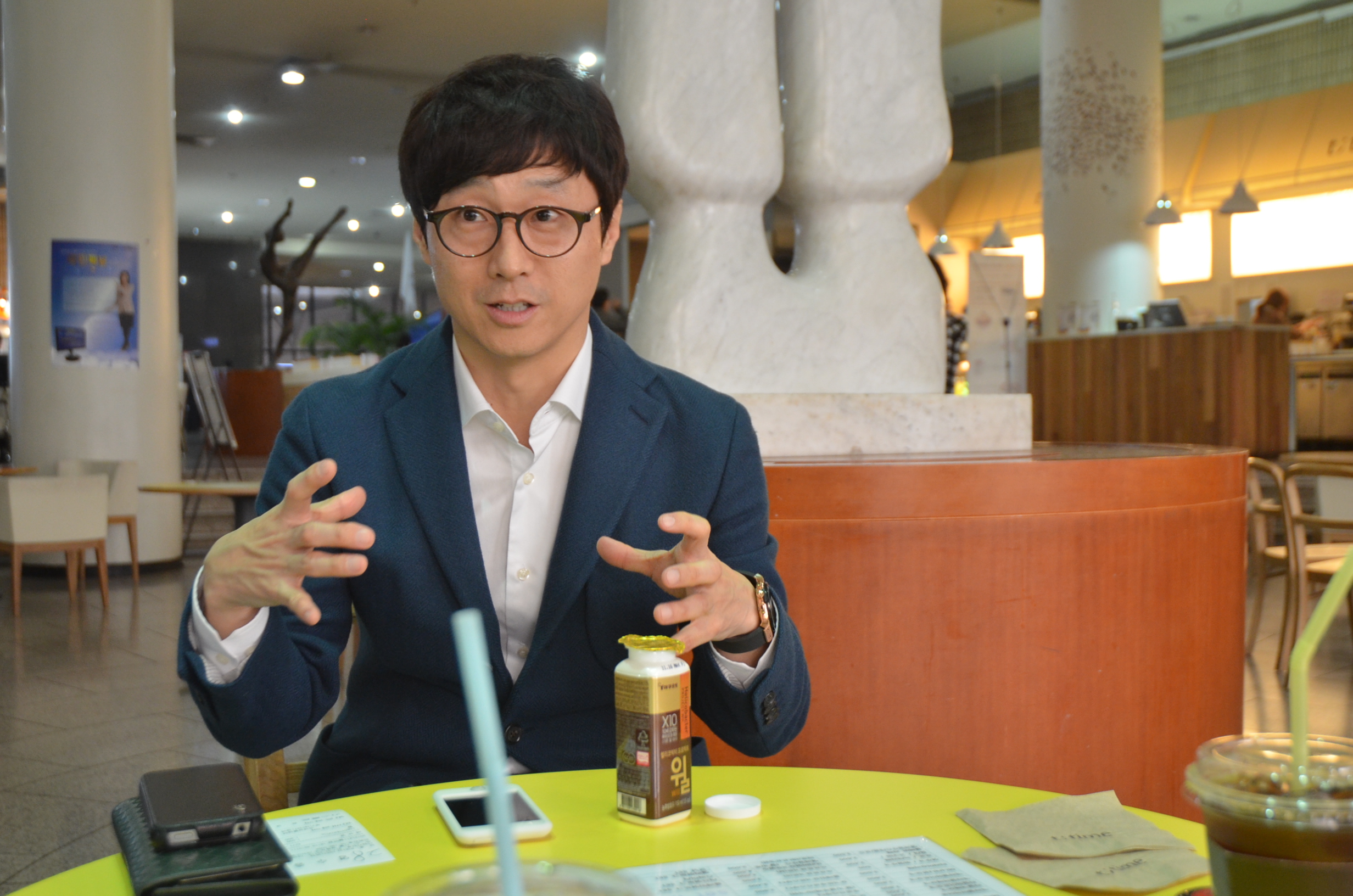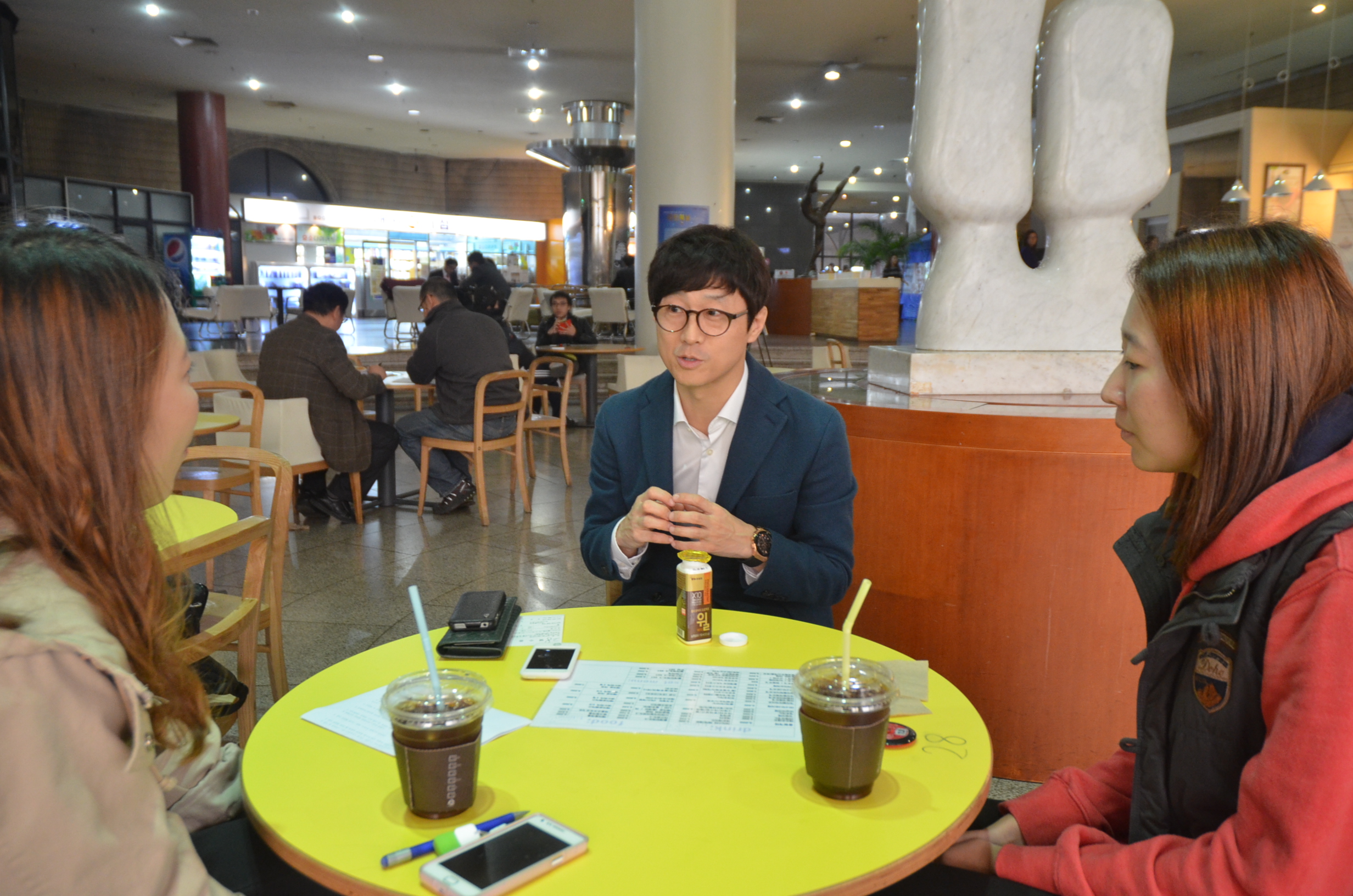[The interview with Lee Kun-chul, the English education expert]
English Education Starts from Touching People.

The 21st century, in which we are living, has been globalizing. According to the globalization, English has become the method of communication between global people, and, in modern society, English education is considered compulsory, not optional. Nevertheless, many students lack interest in studying English, and they are in fear of studying English because they don’t even know what to study. Chungbuk Times reporters met Lee Kun-chul, an English education expert and English mentor, who is showing the right direction of studying English in a fun and touching way. -Ed
★My favorite title is
Anyone can just deliver knowledge, but not everyone can change people. Because I can see people change, I find great pleasure in teaching people. Therefore, I prefer to be called an ‘English education expert’ rather than a broadcaster, translator or professor. However, there is another word that can substitute ‘English education expert.’ It’s ‘English mentor.’ Its meaning is a little bit different from ‘English education expert,’ but that’s my favorite title.
★My own philosophy for my English class is
There is a written sentence on my private home page saying, “Not skills but philosophies!” A skill becomes proficient without thinking if it is done repeatedly. However, if someone tries to deliver knowledge just with skill, teaching will not work. It is important to motivate people to change themselves. People’s thoughts should be changed with my philosophy. My English education philosophy can be summarized by two things. First, don’t try to deliver too much knowledge and touch people with my own philosophy. Second, it should be fun. If an emotion is stimulated, studying goes well. Therefore, it’s a good idea to teach students with the thought, “How can I stimulate students’ emotions?” As I follow the idea, when I teach, I enjoy the class and my students do as well.
★The secret why I am always happy is
Do you know Chu Sin-su, a baseball player, and do you know his batting average? When he is healthy, it’s in the 0.300’s. The life-long batting averages of Babe Ruth and Hank Aaron, the legendary baseball players in U.S., are not over 0.400 even though they are called legends of U.S. baseball. The legendary batting average means if the baseball player tries to hit balls 10 times, he fails 6 or 7 times. I’m not that happy as you might think. I sometimes fail to be happy like those legendary baseball players. However, to be happy, I acknowledge that I sometimes feel depressed. When I feel depressed, all I can do is to encourage myself. If I’m obsessed with that, I feel much more stressful. Energy becomes increased when I’m honest with myself. People who can read and interpret the messages from their emotions can succeed in whatever they do and have a good influence on others.
★Merits and demerits of an English education expert
I’m doing three things as an English education expert. The first one is English education broadcasting. The second one is giving special lectures for local governments, companies and schools. The last one is running an English education on-line game business. There are merits for each. I can have a good effect on many people immediately through broadcasting and can be stimulated from my students when I give special lectures. Moreover, I think the English education on-line game business has a merit in terms that I can teach English easily and entertainingly by combining it with a new field. On the other hand, the demerit that I have as an English education expert is my imbalanced life-pattern, for I have many classes some days and I don’t have any on the other days, which means my schedule is not regular.
★Special episodes at the beginning of my career
I also make mistakes because I’m a human. My first class was at Korea University in 1990, and I was 24 and was taking a graduate course. I was so young when it comes to teaching people. It was snowing hard then, and, in the classroom, there were lots of people who were older than me. Therefore, I dressed with old-styled glasses and a suit to look older. However, my students thought I was an assistant teacher and asked me when the professor would come. It was funny. There were other episodes on the air. I was giving a lecture, and, all of a sudden, I dropped a pen. At that time, I coped with the situation by pretending it was a part of the lecture, saying, “How can we express ‘dropping a pen’ in English?” Similarly, when my voice was hoarse, I cleared my throat, and then I went on with the lecture by saying, “How can we express ‘clearing one’s throat?’” I have learned the ability to accommodate myself to circumstances from my mistakes.
★I think English education in Korea is
When I ask people what they are thinking about English education in Korea, 99% of them give me negative answers. They are both right and wrong. However, if they were completely right, it would have been impossible for me to be who I am now because I’ve never gone to an English academy and I studied only at a school in Korea. Moreover, the president of the U.S., Mr. Obama, mentioned many times about Korean Education during his addresses and praised it. In other words, I do not mean that Korean education doesn’t have a problem, but the thought that all Korean English education is wrong can be a problem itself. Before we talk about the Korean education system, we have to understand about the differences between Eastern and Western cultures. In Korean language, people say that they ‘listen’ to a class and ‘see’ an exam. However, in English people say that they ‘take’ a class and that they ‘take’ an exam, which is the active way to learn.
In Eastern culture, teachers have knowledge, and they deliver it to many students. That’s why they ‘listen’ to a class and ‘see’ an exam to check what they learned in classes. Therefore, at first, we have to understand that the teaching styles between Eastern and Western cultures are different, and then, we have to develop educational programs to improve the problems of Korean education, while keeping its strengths. Therefore, I think it’s important to consider which areas could be improved.
★I want to advise people who want to become English education experts
No matter which goal you establish, the most important thing you have to know is that people who experienced many tiny failures should never be knocked down. If you have to get on bus 27, but you get on bus 39 by mistake, what would you do? You just have to get off the bus and get on bus 37. If you see someone who moves around in confusion, you might think he is foolish. However, that is what we do when we fail. If you fail, you do not name it a failure. You just have to do it in other ways, like transferring buses. Make many tiny mistakes and many petty failures, and then you will have your own philosophy. I hope you enjoy making efforts with that philosophy until you have the power to touch the souls of many people.



 All
All People
People






 서환희
서환희











